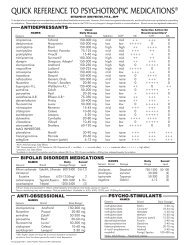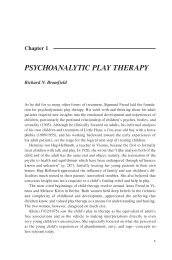IRAQ WAR CLINICIAN GUIDE
Iraq War Clinician's Guide - Network Of Care
Iraq War Clinician's Guide - Network Of Care
You also want an ePaper? Increase the reach of your titles
YUMPU automatically turns print PDFs into web optimized ePapers that Google loves.
Iraq War Clinician Guide 62 Caring for the Clinicians<br />
VIII. Caring for the Clinicians Who Care for Traumatically Injured Patients<br />
Harold J. Wain, Ph.D., MA1 Erin C. McLaughlin, Catherine M. DeBoer, MAJ Geoffrey G. Crammer, Marvin <br />
A. Oleshansky M.D., COL Dermot M. Cotter, MA] Mark F. Owens, Corina M. Miller, L.C.S.W., Rosalie M. <br />
Kogan, L.C.S.W., and COL Stephen J. Cozza <br />
The experiences of physically injured patients impact their surgeons, other physicians, therapists,<br />
nursing staff, and administrators. The intensity of caring for these patients may contribute to the<br />
treatment team's own stress and burnout. Enhancing the clinicians' understanding of how their<br />
feelings and perceptions contribute to their responses to trauma patients can decrease the anlount<br />
of stress and burnout experienced by both clinician and patients. Clinicians' responses to their<br />
patients are often dependent upon the formers' experiences and coping styles.<br />
Vicarious Traumatization<br />
McCann and Pearlman (1 990) acknowledged that clinicians who work with trauma victims may<br />
experience vicarious traumatization. Vicarious or secondary trauma is a countertransference<br />
reaction experienced by the clinician as a result of the victim's retelling of the trauma (Benedek,<br />
1984). Clinicians working with trauma victims often experience a myriad of countertransferential<br />
feelings. Clinicians' responses to the trauma endured by their patients may affect therapeutic<br />
alliances and ultimately the effectiveness of the clinicians (Fischman, 1991; Lyon, 1993).<br />
Clinicians may be affected by painful or disruptive psychological sequelae in the months or even<br />
years following their work with trauma victims. The affective reactions of therapists who worked<br />
with Holocaust survivors and their children included bystander's guilt, rage, grief and mourning,<br />
dread, horror, and inability to contain intense emotions (Danieli, 1984). Clinicians working with<br />
patients who have suffered the extreme trauma of torture may be more vulnerable to intense<br />
affective reactions themselves (Fischman, 1984; Fischman & Ross, 1990).<br />
Riba and Reches (2002) conducted a study to understand experiences of nurses caring for victims<br />
of trauma. Nurse described being anxious and afraid of what they were going to see. Fears about<br />
not being able to perform their job or function properly were reported more often by younger<br />
nurses. Nurses described feelings of frustration and guilt, especially if their patient died. Nurses<br />
experienced restlessness, sleeplessness, and nightmares following the care of trauma patients.<br />
In another study, nurses working with victims of a bombing reported sadness, grief, depression,<br />
anxiety, dread and horror, fear, rage, and shame (Collins, 2001). Nurses also reported difficulties<br />
initiating or maintaining sleep, problems with irritability/outbursts of anger, and difficulty<br />
concentrating. Interestingly, not only psychological symptoms evolve; nurses involved with trauma<br />
patients may present with somatic complaints such as persistent headaches, backache, and<br />
gastrointestinal distress (Collins, 2001; Lyon, 1993). In summary, trauma nurses may experience<br />
vicarious traumatization leading to such symptoms as depression and suicidal tendencies, panic<br />
attacks, and alcohol abuse. Others experienced post-traumatic stress disorder (Collins, 2001).<br />
Alexander (1 990) similarly suggested that other hospital staff working with trauma or disaster<br />
victims might become hidden victims (e.g., dietary, OT, PT, etc.). All of these reports emphasize<br />
that hospital administration must recognize the stress placed on the hospital staff who closely work<br />
with these victims and must also provide needed interventions and support to them.<br />
DEPARTMENT OF VETERANS AFFAIRS<br />
NATIONAL CENTER FOR PTSD




